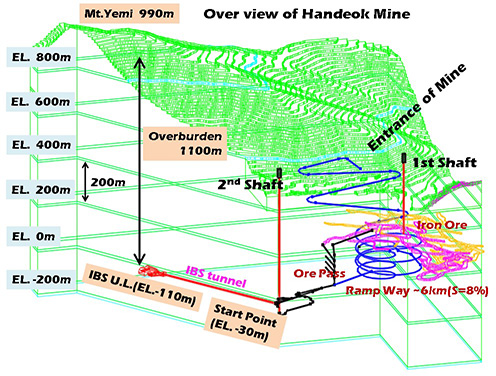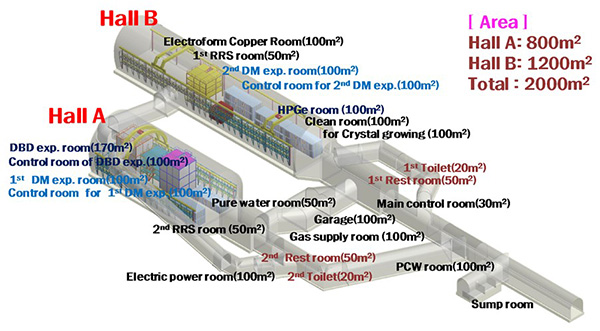주메뉴
- About IBS 연구원소개
-
Research Centers
연구단소개
- Research Outcomes
- Mathematics
- Physics
- Center for Theoretical Physics of the Universe(Particle Theory and Cosmology Group)
- Center for Theoretical Physics of the Universe(Cosmology, Gravity and Astroparticle Physics Group)
- Center for Exotic Nuclear Studies
- Center for Artificial Low Dimensional Electronic Systems
- Center for Underground Physics
- Center for Axion and Precision Physics Research
- Center for Theoretical Physics of Complex Systems
- Center for Quantum Nanoscience
- Center for Van der Waals Quantum Solids
- Chemistry
- Life Sciences
- Earth Science
- Interdisciplinary
- Center for Neuroscience Imaging Research(Neuro Technology Group)
- Center for Neuroscience Imaging Research(Cognitive and Computational Neuroscience Group)
- Center for Algorithmic and Robotized Synthesis
- Center for Genome Engineering
- Center for Nanomedicine
- Center for Biomolecular and Cellular Structure
- Center for 2D Quantum Heterostructures
- Center for Quantum Conversion Research
- Institutes
- Korea Virus Research Institute
- News Center 뉴스 센터
- Career 인재초빙
- Living in Korea IBS School-UST
- IBS School 윤리경영


주메뉴
- About IBS
-
Research Centers
- Research Outcomes
- Mathematics
- Physics
- Center for Theoretical Physics of the Universe(Particle Theory and Cosmology Group)
- Center for Theoretical Physics of the Universe(Cosmology, Gravity and Astroparticle Physics Group)
- Center for Exotic Nuclear Studies
- Center for Artificial Low Dimensional Electronic Systems
- Center for Underground Physics
- Center for Axion and Precision Physics Research
- Center for Theoretical Physics of Complex Systems
- Center for Quantum Nanoscience
- Center for Van der Waals Quantum Solids
- Chemistry
- Life Sciences
- Earth Science
- Interdisciplinary
- Center for Neuroscience Imaging Research(Neuro Technology Group)
- Center for Neuroscience Imaging Research(Cognitive and Computational Neuroscience Group)
- Center for Algorithmic and Robotized Synthesis
- Center for Genome Engineering
- Center for Nanomedicine
- Center for Biomolecular and Cellular Structure
- Center for 2D Quantum Heterostructures
- Center for Quantum Conversion Research
- Institutes
- Korea Virus Research Institute
- News Center
- Career
- Living in Korea
- IBS School
News Center
| Title | Uncovering the secrets of dark matter and neutrinos in 1,100m deep underground | ||||
|---|---|---|---|---|---|
| Name | Department of Communications | Registration Date | 2017-08-29 | Hits | 3825 |
| att. |
 thumb.jpg
thumb.jpg
|
||||
Uncovering the secrets of dark matter and neutrinos in 1,100m deep underground- Institute for Basic Science (IBS) signed an MoU (Memorandum of Understanding) with Jeongseon county and Handeok Iron Mine for construction of a new astro-particle physics underground research facility - Center for Underground Physics (CUP, Director KIM Yeongduk) of IBS will construct an astro-particle research facility at 1,100m below the surface in an iron mine located in Jeongseon county, Gangwon province, South Korea. With a planned funding of 21 billion won, the construction of a 2,000m2 experimental area directly below the summit of the Mount Yemi will be completed by 2019 and the center's two major experiments are expected to start from the following year.
Currently, CUP is conducting astro-particle physics experiments in a 300m2 facility located 700m below the surface in the Korea Hydro & Nuclear Power's pumped-storage hydro plant in Yangyang county, Gangwon province. However, the need for a new facility emerged as the current facility has reached its space limit and a tunnel safety regulation prevents further expansion. More importantly, the new facility will be built in a 400m deeper place than the current laboratory, providing five times more reduction of cosmic-ray background, which will bring CUP closer to its goals of discovering what dark matter is and finding the mass and characteristics of neutrinos. Uncovering the mysteries of as-yet-unidentified dark matter and ghost-like neutrinos has been one of the biggest tasks in modern physics. Detecting dark matter and weighing neutrinos' masses will greatly improve our understanding of the origin of the Universe and the existence of matter. However, signals from dark matter and neutrinos are very difficult to detect because they manifest into detectable particles via the weak interaction. Given the very faint signals, sources of background noise (i.e. cosmic rays) must be reduced as much as possible, which makes sense when you think about trying to listen to a quiet voice in a soundproof room versus in a busy downtown street. This is why physicists around the world are eager to install their detectors in deep underground. Professor Takaaki Kajita (Nobel Prize in Physics, 2015) of the University of Tokyo lead to observe disappearing and reappearing neutrinos when the particles travel a certain distance, called "neutrino oscillations", using the Super-Kamiokande detector, located at a 1,000m deep underground laboratory in a closed mine. A measurement of neutrinos' masses requires highly sensitive equipment capable of detecting their extremely tiny signals. The CUP's new experiment in the advanced facility will improve detection sensitivity by a large margin, making a neutrino mass of about 20 meV (milli-electron volt: a unit of energy) detectable. The current CUP experiment at Yangyang has a sensitivity of 200 meV, while the world's most sensitive neutrino detector can detect 100 meV neutrinos. A larger and deeper facility allows researchers to achieve lower background noises and in turn improve the possibility of finding the rare signals.
People from CUP expect to create a research environment comparable to the world-class research groups with the addition of the new facility. More active cooperation among Korean and international research institutes is also expected as the other institutes' equipment will be installed along with the IBS' within the facility. Director KIM Yeongduk said, "The new facility will bring astro-particle physics research a step further and produce outcomes with global impact." He also added that CUP would make every effort to advance the local community on science. The president of IBS, KIM Doochul, signed an MoU for the construction of the astro-particle research facility with Jeongseon county (Governor JEON Junghwan) and Handeok Iron Mine (CEO KIM Myungju) on August 17th at the Jeongseon county office. This MoU will bring more momentum to head-start the astro-particle research facility project through a strengthened cooperation with the local government. IBS had already signed an agreement for the construction project on the site of Handeok Iron Mine in December 2016. Jeongseon County hopes to see the new project make a contribution not only to the advancement of Korea's basic science, but also to the development of the local community. CUP is currently working on two main research projects, AMoRE (Advanced Mo-based Rare process Experiment) and COSINE-100. AMoRE explores the question on characteristics of neutrinos by observing the neutrinoless double-beta decay with a detector installed in an ultra-low temperature cryostat. AMoRE will provide clues to a question on why the Universe is made of mostly matter without antimatter (matter-antimatter asymmetry). The COSINE-100 experiment aims to search for dark matter which holds a key to unlock the secrets of the Universe's birth and composition. The experiment measures signals released when dark matter, which is believed to be abundant in the galaxy, collides with detectors on rare occasions. Its main focus is to discover a weakly interacting massive particle, or WIMP, which is one of the candidates for the dark matter. |
|||||
| Next | |
|---|---|
| Next |
- Content Manager
- Public Relations Team : Yim Ji Yeob 042-878-8173
- Last Update 2023-11-28 14:20













